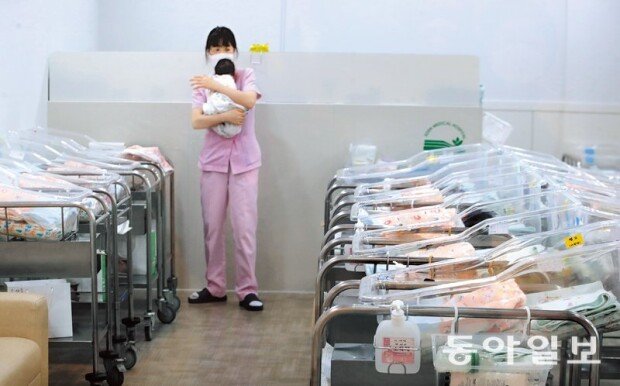South Korea’s birthrate plummets to historic low of 0.6
South Korea’s birthrate plummets to historic low of 0.6
Posted February. 29, 2024 07:46,
Updated February. 29, 2024 07:46

South Korea experienced a significant decline in its birthrate, reaching 0.6 in the fourth quarter of 2023, marking a historic low. Although the annual birthrate maintained a slightly higher figure at 0.7, the number of babies born in 2023 plummeted by almost half over the past eight years, totaling a mere 230,000. Notably, this forthcoming year is anticipated to witness an even more diminished number of newborns, making South Korea the first country globally to show an annual birthrate as low as 0.6.
The Statistics Korea revealed that the total fertility rate in the fourth quarter of 2023 was 0.65, indicating a decrease of 0.05 compared to the previous year. The total fertility rate denotes the average number of children a South Korean woman is expected to have in her lifetime. In practical terms, this translates to 65 babies for every 100 couples or 200 adults. Should this fertility rate persist, South Korea’s population is projected to be nearly one-third that of the parent generation.
In 2023, the annual number of births stood at 0.72, reflecting a decline of 0.06 from the preceding year’s figure of 0.78. This rate is comparable to that of Ukraine, which is currently at war with Russia, where the fertility rate in 2023 was reported as 0.7. “South Korea demonstrated the world’s lowest fertility rate, excluding certain city-states like Hong Kong,” said Lim Young-il, Statistics Korea’s Demographic Trend Department chief. “The reduction in the total fertility rate was most significant in 2023 over the past three years, and this seems to be attributable to a decline in the number of married couples during the Covid-19 pandemic.”
South Korea has consistently displayed the lowest fertility rate among OECD countries for 11 consecutive years since 2013, standing as the sole nation among the 38 OECD countries with a fertility rate below one. South Korea’s birthrate is less than half of the OECD average, which was recorded at 1.58 as of 2021.
Projections from the South Korean government indicate a continued decline in both the fertility rate and the number of newborns. Statistics Korea estimated that this year's total fertility rate will decrease to 0.68.
세종=조응형 기자 yesbro@donga.com







